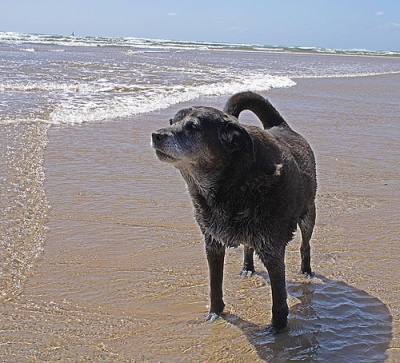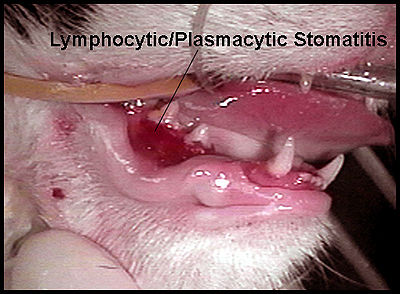
Humans aren’t the only ones who have to deal with arthritis. Dogs and cats are both susceptible to it as they age. Arthritis is sometimes caused by infection of the joint, but most likely it’s just due to wear and tear throughout the years. Unfortunately, pets can’t explain their symptoms, which can make it hard to diagnose in the beginning. You may notice some changes in your pet’s behavior but be unsure of the cause. Always seek the advice of your veterinarian in case these symptoms are being caused by a different disease or infection that requires immediate treatment.
So here are some signs to watch for and how to manage your cat’s or dog’s arthritis pain.
Warning Signs that your Pet could have Arthritis:
- Slowed movement
- Joints are swollen or red
- Stiffness and trouble getting up from a sitting/lying position
- Pain (Flinching from petting or handling)
- Some limping
- Inability to climb stairs
- Hard time getting in and out of the litter-box
How to Treat & Manage:
- Watch your pet’s weight – Extra weight produces strain on joints, just like it does in humans. By managing your pet’s diet and lower its weight you can help the amount of stress on the joints. It can also help with combating other diseases like heart disease or diabetes.
- Massage – Massage helps increase blood flow in the muscles and that can be good for sore joints.
- Warmth and Comfort – Cold temperatures and dampness can intensify arthritis pain. Make sure your cat or dog has a warm, soft bed and stays inside while it rains or snows.
- Medicine – See your vet in case the joint pain is due to infection, in that case they may prescribe steroids or antibiotics. Caution aspirin and acetaminophen can be dangerous for cats and some dogs with stomach problems, so don’t self-prescribe.
- Supplements – Natural supplements are a good option for cats or dogs with sensitive stomachs or who don’t react well to harsh medications. FlexPet with CM8 [1] is an all natural arthritis supplement that is currently helping thousands of dogs and cats suffering from the painful disease. It is the only dog joint pain relief supplement with the patented CM8 ingredient, clinically proven to stimulate join fluid lubrication, strengthen cartilage and increase mobility.
- Exercise – You may assume that exercise will further strain the joints but it can actually help build muscles and strengthen the areas around the joint, therefore lessening the pain. It can be very challenging to get a cat exercise if they are in pain. Try a walk on a leash, even for a cat, introduce a new toy and play with your dog or cat.
Again, always seek the advice of your Veterinarian in case these symptoms are being caused by a different disease or infection that requires immediate treatment.
FlexPet™ with CM8 is an all-natural Joint Pain Supplement. The primary component of FlexPet is CM8™, which relieves joint pain at its source, reduces inflammation and irritation of the joints and tissues. It has been helpful for many canine and feline sufferers of arthritis and joint pain. To read more stories like this visit the FlexPet Blog [2]for pet health advice and stories from customers.
There has been much success with Glucosamine/Chondroitin supplements. This supplement strengthens cartilage which in turn helps ease the pain of arthritis.
In tests, Doxycycline, an antibiotic, has shown to help prevent the progression of arthritis. Further testing is being done to determine dosage.
Reprint, Topeka, Kansas (March 10)
A series of recently published scientific papers have indicated that diets rich in fatty acids may reduce symptoms of osteoarthritis in dogs.
Three papers published in the January and March editions of the Journal of the American Veterinary Medical Association investigated the effects of feeding a diet supplemented with fish oil omega-3 fatty acids on dogs with osteoarthritis, and all three papers concluded that the results were positive.
In a paper titled “A multicenter study of the effect of dietary supplementation with fish oil omega-3 fatty acids on carprofen dosage in dogs with osteoarthritis”, a team from Hill’s Pet Nutrition Inc’s Pet Nutrition Center studied whether dogs with supplementation ended up receiving less of the anti-inflammatory drug carprofen. The dosage of carpofen was decided based on investigators’ assessments of 5 clinical signs and owner assessments of 15 signs of osteoarthritis. In dogs with supplemented diets, the dosage of carprofen they received decreased significantly faster over the 12-week study period that in the control group. The team concluded that where dogs are receiving carprofen to reduce pain, a diet with increased omega-3 fatty acids will decrease the carprofen dosage required for alleviation of symptoms.
In another paper, titled “Multicenter veterinary practice assessment of the effects of omega-3 fatty acids on osteoarthritis in dogs” and supported by Hill’s Pet Nutrition Inc, researchers investigated the effect of food containing high concentrations of fish oil omega-3 fatty acids and a low omega-6–omega-3 fatty acid ratio on the clinical signs of osteoarthritis in dogs. According to the owners of dogs on a supplemented diet, their dogs had a significantly improved ability to rise from a resting position and play at 6 weeks and improved ability to walk at 12 and 24 weeks after starting feeding.
In the third paper, titled “Evaluation of the effects of dietary supplementation with fish oil omega-3 fatty acids on weight bearing in dogs with osteoarthritis”, also supported by Hill’s Pet Nutrition Inc, researchers investigated the effects of a food supplemented with fish oil omega-3 fatty acids on weight bearing in dogs with osteoarthritis. The team concluded that dogs eating the supplemented food had improved weight bearing.
All three papers appear to show that diets rich in omega-3 fatty acids can bring a range of benefits, at least in the short-term, to dogs suffering from osteoarthritis. Dog owners can expect to see increased mobility, weight-bearing and more playful behavior in a relatively short period after beginning to feed a diet rich in fish oil omega-3 fatty acids.
This news story is independently sourced and PetPeoplesPlace.com



